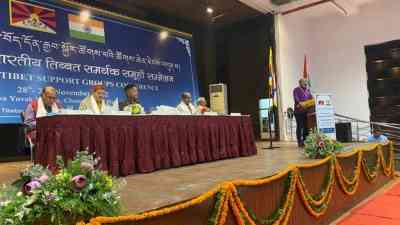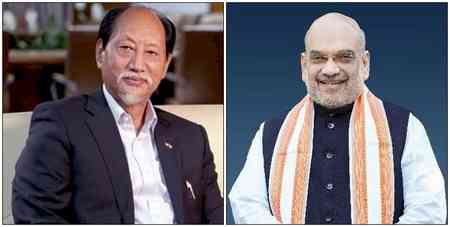India must recognise Tibetan administration: Support groups
The Indian government must recognise the Central Tibetan Administration (CTA) as the legitimate representative of Tibetans worldwide while ushering complete support of the 'middle-way approach' in resolving the Sino-Tibet conflict, say Tibet support groups.

Dharamsala, Nov 30 (IANS) The Indian government must recognise the Central Tibetan Administration (CTA) as the legitimate representative of Tibetans worldwide while ushering complete support of the 'middle-way approach' in resolving the Sino-Tibet conflict, say Tibet support groups.
Also delegates at the conclusion of the two-day conference of Pan India Tibet Support Groups in Delhi petitioned to denounce China's intervention in the reincarnation of Tibetan tulkus and called for more political involvement or support to defend the national identity of the Tibetan people.
The conference which concluded on Tuesday adopted many declarations pursuant to the Tibet Policy and Support Act 2019 passed by the US Congress.
The declarations adopted at the conference serve as a roadmap to induce clear policies on Tibet by the Government of India.
Keynote speakers at the valedictory session include Speaker Khenpo Sonam Tenphel of the Tibetan parliament-in-exile, Neerja Madhav, renowned author, K.C. Agnihotri, former Vice Chancellor of Himachal Pradesh Central University, and Karma Choeying, CTA Secretary.
The Speaker of the Tibetan parliament lauded the Core Group for Tibetan Cause's leadership in ensuring the Tibetan movement's sustenance.
He acknowledged in gratitude India's considerable support to Tibetans for the last 60-plus years, adding, "India is the only country who held our hand when we needed it the most; therefore, we are indebted to the Indian government and its people."
While the Tibetan cause continues to receive ample support from governments and policymakers worldwide, many still view Tibet as an internal affair of China.
The Speaker warned that accepting the legitimacy of China's claim over Tibet is to breach international human rights law.
He cautioned India about China's capability to stretch its authoritarian regime beyond Tibet, which they have repeatedly demonstrated through incursions and military confrontations at the Indo-Tibet border.
He pointed out that so long as the Tibetan issue remains unresolved India's long-standing border clash with China will remain undeterred.
"The centrality of Tibet is a key factor in resolving the China-India conflict. Therefore, India can't avoid Tibet as Tibet remains the key factor in the Sino-Indian conflict. The need to resolve the issue of Tibet is imperative for India's stability and peace with China," he said.
The Speaker also underscored the threat of China's hunger for global domination and its pursuit of expansive goals, urging India and the neighbouring Asian countries to form a multilateral alliance to counter China.
Secretary Karma Choeying detailed pressing issues concerning Tibet and the Tibetan people, particularly highlighting the geopolitics of Tibet's climate change, its transboundary rivers, and large-scale cultural genocide authorised by the Chinese government.
Being the primary source of 10 major rivers, Tibet supports the lifeline of over 1.9 billion people in South and South East Asia, including India and China.
However, because of the global rise in temperature, the Tibetan plateau has recorded a significant temperature increase over the last decade.
Underlining the deteriorating environmental situation inside Tibet, Secretary Choeying strongly urged for global initiative in calling out China for indiscriminately destroying the ecology of the Tibetan plateau under the guise of 'development'.
He cautioned India to pay considerable attention to the rejuvenation and revitalisation of Tibet's ecology and perhaps prioritise this concern in their policies on China.


 IANS
IANS 








